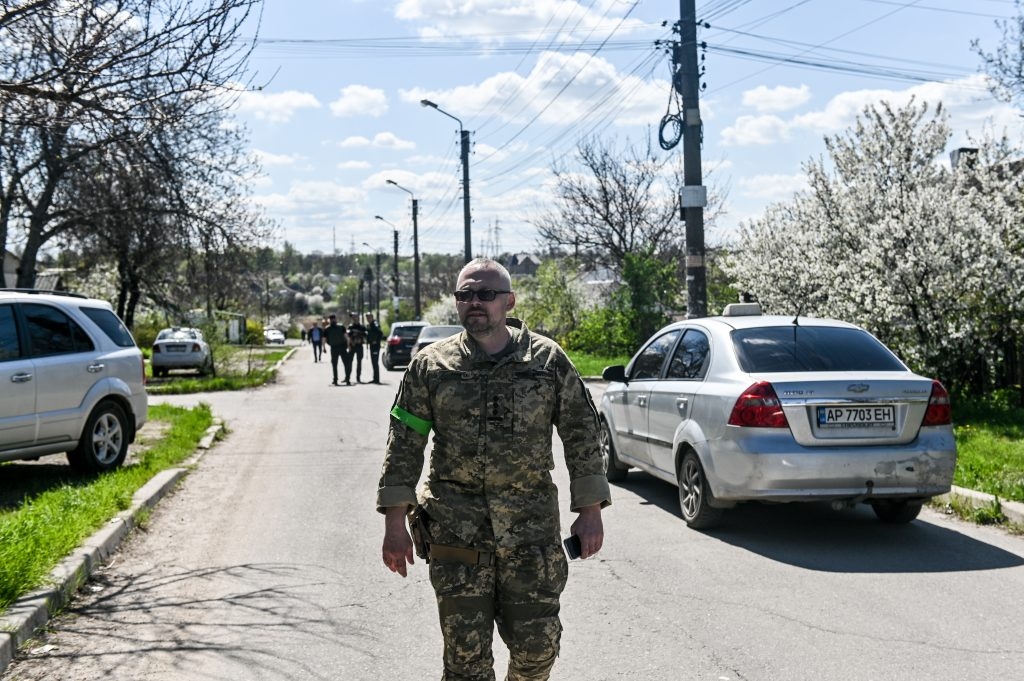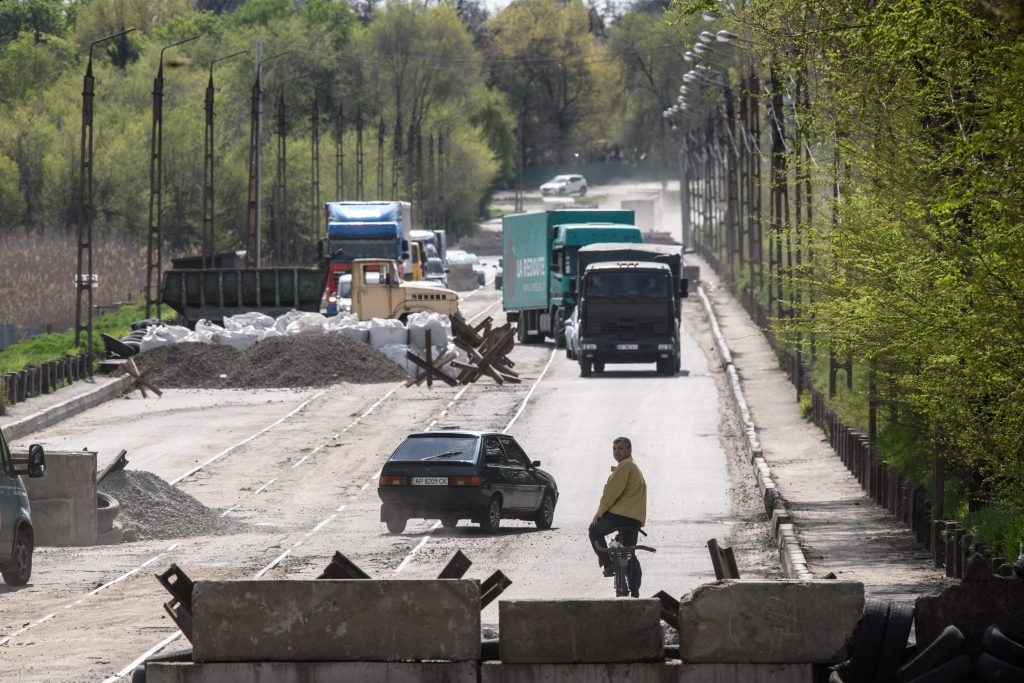Zaporizhzhia fights as Russians intensify offensive in region

ZAPORIZHZHIA – Along the freshly green riverbanks, the flowers are in bloom. People are outside, enjoying t-shirt weather in the spring sun. The central city streets are busy with life.
This is almost enough to take one’s mind off the city’s many checkpoints and barricades and what they signify. But these moments of stolen tranquility are shattered by the deadly blast of incoming Russian missiles, followed by the air raid siren’s mournful wail.
At night, Zaporizhzhia goes eerily dark as an anti-airstrike measure, letting the big bright stars shine uncontested.
Closer to the front line, south and east of this strategic industrial city on the Dnipro River, a non-stop barrage of rockets can be heard through the day and night.
“Zaporizhia Oblast is, as you know, in flames and people are telling scary stories,” said Kateryna Chernova, the coordinator of an IDP shelter in the basement of one of the city’s factories.
According to President Volodymyr Zelensky, Russia launched the Battle of Donbas on April 18. It’s the next major phase of its war, after it lost the Battle of Kyiv and was forced to pull out of much of Ukraine’s north.
As part of this offensive, the Russians greatly intensified their attacks in Zaporizhzhia Oblast. For now, Ukrainian forces are holding them back, according to local officials, though evacuees have told the Kyiv Independent that the Russians are slowly advancing.
“In the east, there’s been a very strong activation by Russian forces but they haven’t achieved their targets,” Oleksandr Starukh, the regional governor, told the Kyiv Independent. “On March 5, a front line was established that has gone practically unchanged since then.”
Zaporizhzhia is one of Ukraine’s southern regions — it sits on the Azov Sea, between Donetsk and Kherson oblasts. It contains the vital city of Enerhodar, home of the Zaporizhzhia Nuclear Power Plant, seized in February by Russian forces. It also contains the cities of Melitopol and Berdyansk, also under Russian occupation.
The regional capital is a major road, rail and industrial hub with a hydroelectric power plant located in the heart of Ukraine, an important prize to hold. It’s also the historic home of the freedom-loving Zaporizhzhian Cossacks who once fought against Moscow's armies and exemplified their land’s passion for independence.
Western analysts have given the Russians better odds in the open reaches of southern Ukraine, where they can mass their tanks. But Andriy Zahorodnyuk, former defense minister and head of the think tank Center for Defense Strategy said the Russians aren’t doing so well in the region.
“Their whole operation in the east is not working out for now,” he said, citing the Russians’ “colossal losses.”
However, Ukrainian losses are also high, according to presidential adviser Oleksiy Arestovych. Zahorodnyuk said that Ukrainian forces are having a "very, very tough" time.
Active fighting
The regional military administration said that "active battles" are ongoing throughout Zaporizhzhia Oblast. According to Volodymyr Marchur, a Zaporizhzhia military spokesman, while the line remains stable for now, Russians have intensified attacks in areas of Hulyaipole and Orikhiv.
"We left because the shooting was massive," Svitlana Kozyr from the village of Orikhiv told the Kyiv Independent in Chernova’s shelter. "Two days before we left, it got really intense with Grad fire targeting the civilian population."
According to Marchur, Ukrainian forces are dug in, making it hard to dislodge them without big losses. Lines of trenches have been dug around the regional capital.
Instead of advancing quickly, Russian forces are relying on artillery and rocket attacks, the spokesman said.
“Knowing we’re dug in, they don’t have the strongest desire to attack,” Marchur told the Kyiv Independent. “They’ve lost substantial numbers throughout the country.”
Zahorodnyuk said as part of their eastern offensive, Russian forces are pushing in many different places at once to probe out weaknesses and stretch the Ukrainian forces’ attention. “This is not working,” he said.
He added that the Russians’ top priority remains the Donbas, with other offensives, including in Zaporizhzhia being secondary. He added that they will have significant problems advancing through the Oblast and are not close to having a shot at the regional capital.
The front line is 30-40 kilometers out from the city, placing it outside the range of most artillery and short-range rockets, Marchur said. There’s less that can be done about the cruise missiles that strike the regional capital every few days.
The latest attack happened on April 28, with three known casualties, including one child.

Earlier, three missiles arrived early in the morning of April 26. Two of them struck the city’s aluminum plant and killed a security guard. These missiles passed over the nuclear power plant in their flight, which head of state nuclear operator Energoatom warned "threatens a nuclear and radiation catastrophe."
The intensified fighting is driving more people out of the contested areas, towards the regional capital.
Lena, who was displaced from the village of Poltavka, said Russians have advanced slowly, shelling generously and she’s had to flee their forces multiple times. Most buildings in her area were hit by something, including her family’s three houses. She declined to provide her last name because her husband is an active duty Territorial Defense fighter.
He told her to leave with their three small children because they heard that Russians kidnap spouses of service members to swap them for POWs. She claims this happened to several women in her village.
According to Starukh, 218 people in the region have been “stolen” by the Russians. The mayor of Melitopol has stated that over 100 people were kidnapped in his city alone.
Lena went on to Nova Mykhailivka but the Russians soon entered this village “without firing a shot.” She grabbed her kids and documents and ran, hoping to avoid what happened to her friend, who was wounded with her 5-year-old daughter while fleeing the village of Malynivka.
Despite their gains, the Russians have reportedly experienced setbacks. According to Lena, 60 Russian soldiers came to local government heads in her area and offered to hand in their weapons if they could live somewhere in Ukraine and don’t have to go back to Russia.
“They said there’s no way back for us, they’ll either shoot us or put us in jail,” she said.
Captured areas
The captured areas of Zaporizhzhia Oblast are quieter, though there are still signs of intensified fighting, said local residents who escaped. All of them declined to be identified by last name for the sake of security.
Yevheniy, who recently escaped from a village outside Melitopol, said that he saw a stream of Russian armor pouring out of the captured city over the past two weeks.
Mykola, who escaped from Enerhodar, said Russians locked the area down tight, especially around the nuclear plant. "Every 10 meters there's a tank" there, he said. The Russians installed a new “mayor” in Enerhodar and relaunched schools and kindergartens, trying to pretend like life is back to normal.
Some IDPs who escaped from the devastation of Mariupol through occupied Berdyansk over the past few weeks, told the Kyiv Independent they were shocked when they saw people relaxing or catching fish on the peaceful waterfront, while a few Ukrainian flags continued to hang, although these may have been taken down by now.
Still, Berdyansk remains under an "information blockade," with local media suppressed by the occupiers, according to the National Union of the Journalists of Ukraine. Reporters Without Borders said Russian troops in Berdyansk and elsewhere in the region are searching journalists and seizing their equipment.
Propaganda is active in occupied areas. Regional authorities relayed how some residents of the occupied district of Rozovka were forced to vote in a sham referendum to join the illegitimate occupation government in Donetsk Oblast last week.
The occupied areas of Zaporizhzhia Oblast appear to be held by a mix of Russian soldiers, people mobilized from occupied Donetsk and Luhansk, and the Chechen military.
Yevheniy said it looks as if there’s barely any communication among them with commanders losing track of units that have gone somewhere to loot or cause trouble.
"In our area it was calm," he said. “In the neighboring area, they got drunk, rolled through the village and shot next to people" for entertainment.
This wasn’t an isolated incident, according to Tasia, who fled the Hulyaipole area with her family.

Tasia said in her village, one soldier snapped off a burst of rifle fire at her husband for no reason. Later, he became suspicious of her 17-year-old son and another boy his age and ordered them out of their shelter to see his commander. Both teens’ mothers came along and stood in front of them. The commander ordered both boys to be released. Later, Tasia was told that the soldier was beaten up by his comrades and transferred elsewhere.
Mykola was also threatened as he tried to flee from Enerhodar to Zaporizhzhia. Four assault rifle-toting Russian soldiers stopped his car near Vasylivka. Mykola’s Russian-sounding accent convinced one of them that he’s a Russian traitor, who needs to be summarily shot. The soldier then ripped up Mykola’s Ukrainian documents, jeopardizing his escape.
"One of them says ‘let me kill this old f*ck,’" Mykola recalled. The commander told them to let Mykola go but warned that if they ever saw him near Enerhodar again, they'd kill him. He managed to get into Zaporizhzhia without his documents and is now trying to replace them.
According to Ukraine’s Central Intelligence Directorate, the locals can give as good as they get. It reported that in three weeks, 70 Russian troops have been killed around Melitopol by civilian resistance. So far, Marchur said he’s not aware of any revenge killings by the Russians.
"They're more careful here," he said.










